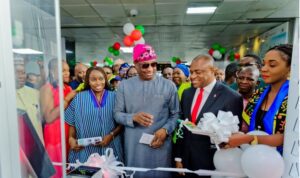Naira appreciates by 0.06% at I & E FX window
By Aanu Olaleye
The exchange rate between the naira and the dollar closed at N411.25 against the dollar, 0.06 per cent from N411.50/$1 at the official Investors and Exporters window.
Also, naira appreciated at the parallel market to close at N508 against the dollar, having traded at N506 against the dollar at the previous day.
This represents a N2 gain when compared to the previous day’s rate.
The strengthening of the naira at the black market appears to have continued as the official window maintains stability with a 10.2per cent rise in dollar supply.
Normalcy appears to be returning to the forex market after the initial panic due to the CBN’s decision to stop allocating foreign exchange to Bureau De Change (BDC) operators.
The opening indicative rate closed at N411.34/$1 on Wednesday, this represents a 16 kobo gain when compared to the N411.50/$1 that it closed at on Tuesday.
An exchange rate of N413 to a dollar was the highest rate recorded during intra-day trading before it settled/ at N411.50/$1, while it sold for as low as N400/$1 during intra-day trading.
Meanwhile, forex turnover at the Investors and Exporters (I&E) window was $126.92million on Thursday.
According to the FMDQ, forex turnover increased from $115.17 million recorded on Tuesday to $126.92 million on Wednesday.
The overnight lending rate contracted by 350basis points to 5.5per cent amid outflows for CBN’s weekly OMO auctions.
Trading in the NTB secondary market ended on a bullish note, as the average yield contracted by 18 basis points to 5.5per cent.
Across the benchmark curve, the average yield was flat at the short end but contracted at the mid (-12 basis points) and long (-29 basis points) segments due to demand for the 175DTM (-20 basis points) and 208DTM (-48 basis points) bills, respectively.
Similarly, the average yield at the OMO segment contracted by five basis points to eight per cent.
The Treasury bond secondary market was also bullish, as the average yield contracted by 5bps to 11.9%. Across the benchmark curve, the average yield contracted at the short (-7bps), mid (-3bps) and long (-5bps) segments due to demand for the JAN-2022 (-18 basis points), MAR-2027 (-15 basis points) and MAR-2036 (-18 basis points) bonds respectively.
Meanwhile, the country’s foreign reserve increased by $28 million on Tuesday to close at $33.512 billion compared to $33.484 billion recorded as of 2nd August 2021.
Since the reserve started moving positively, it has gained over $418.1 million in just 21 days despite enduring a significant plunge in the previous months.
Recall that the Central Bank of Nigeria banned the sale of foreign exchange to Bureau De Change (BDC) operators in the country, due to reports of the operators’ illegal trading of the dollar, trading beyond the limit threshold of $5,000 and gradually dollarizing the Nigerian economy, according to the CBN governor.




